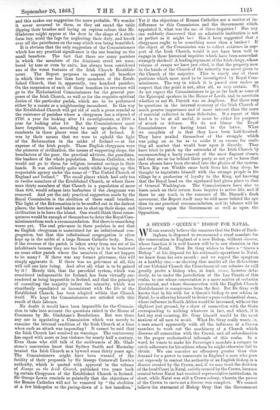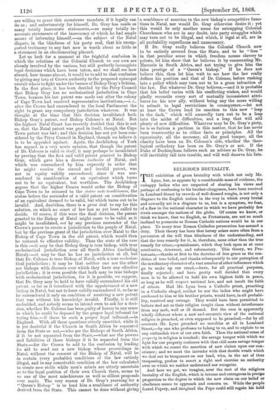A SECOND " QUEEN'S " BISHOP FOR NATAL.
WE can scarcely believe the rumours that the Duke of Buck- ingham is disposed to recommend a royal mandate for the consecration in England of a new Bishop, without diocese, whose function it is well known will be to sow disunion in the diocese of Natal. That Dr. Gray wishes to have a "Queen's Bishop" at his disposal for his schismatic operations in Natal, we know from his own mouth ; and we regard the symptom as a healthy one,—as showing that amidst all the distractions of our Colonial Church the Churchmen of our colonies do still greatly prefer a bishop who, at least, seems, however delu- sively, to be under the jurisdiction of the Lay Courts of this realm, to one whose consecration is a mere matter of sectarian ceremonial, and whose disconnection with the English Church Etablishment is conspicuous from the first. But Dr. Gray well knows that in his wish for a Queen's bishop to sow schism in Natal, he is allowing himself to desire a pure ecclesiastical sham, whose influence in South Africa would be increased, without the slightest just ground, by a show of connection with the State corresponding to nothing whatever in fact, and which, if it had any real meaning, Dr. Gray himself would be the most anxious of all men to avoid. What Dr. Gray really wants, is, a man armed apparently with all the influence of a Crown mandate to work out the machinery of a Church which disowns all connection with the Crown, and all subordination to the proper ecclesiastical tribunals of this realm. In a word, he wants to make his Sovereign's mandate a catspaw to catch adherents for his schism whom he might otherwise fail to obtain. We can conceive no effrontery greater than this demand for a power to consecrate in England a man who goes out expressly to contest the authority of an English bishop in a diocese created by the Crown, and, if we may trust the decision of the local Court in Natal, validly created by the Crown, because created before Natal had received representative institutions, in short, while Natal was still a Crown colony, wherein the power of the Crown to carve out a diocese was complete. We cannot believe the statement of Bishop Gray that the Government are willing to grant this monstrous mandate, if it legally can do so ; and unfortunately for himself, Dr. Gray has made so many totally inaccurate statements,—so many totally in- accurate statements of the inaccuracy of which he had ample means of informing himself, —on the subject of the Natal dispute, in the blindness of his party zeal, that his unsup- ported testimony to any fact now is worth about as little as a statement in an electioneering placard.
Let us look for a moment at the frightful eonfusion in which the relations of the Colonial Church to our own are already involved by the various, but still perfectly incomplete legal decisions which have been taken, and we shall see how absurd, how insane almost, it would be to add to that confusion by giving any iota of Crown authority to the proposed episcopal recruit who is to fight under the banner of Bishop Gray's Schism. In the first place, it has been decided by the Privy Council that Bishop Gray has no ecclesiastical jurisdiction in Cape Town, because his last patent was made out after the colony of Cape Town bad received representative institutions,—i. e., after the Crown had surrendered to the local Parliament the right to grant any compulsory jurisdiction whatever. It was thought at the time that this decision invalidated both Bishop Gray's patent, and Bishop Colenso's at Natal. But the highest Natal Court has recently decided that this is not so, that the Natal patent was good in itself, though the Cape Town patent was bad ; and this decision has not yet been con- sidered by the Privy Council in England, though we believe it is to be appealed against. Again, the Archbishop of York has argued, in a very acute opinion, that though the patent of Dr. Colenso is valid in itself, it may perhaps be invalidated by proving that the first and valid patent granted to Bishop Gray, which gave him a diocese inclusive of Natal, and which was surrendered by him expressly in order that he might receive the second and invalid patent, was not in equity validly surrendered, since it was sur- rendered in consideration of an equivalent which turns out to be no equivalent, but worthless. The Archbishop argues that the higher Courts would order the Bishop of Cape Town to be restored to the status ante traditionenz, the status before the surrender of a valid patent on consideration of an equivalent deemed to be valid, but which turns out to be invalid. And, doubtless, there is a great deal to say for this solution, on which no court of law has as yet been called to decide. Of course, if this were the final decision, the patent granted to the Bishop of Natal might cease to be valid, as it might be invalidated, not by any previous surrender of the Crown's power to create a jurisdiction to the people of Natal, but by the previous grant of the jurisdiction over Natal to the Bishop of Cape Town in the old patent, which would then be restored to effective validity. Thus the state of the case is this :—it may be that Bishop Gray is true bishop, with true ecclesiastical jurisdiction over all South Africa (including Natal) :—it may be that he has no jurisdiction at all, but that Dr. Colenso is true Bishop of Natal, with a true ecclesias- tical jurisdiction ; it may be that neither one nor the other are bishops with dioceses over which they have any effective jurisdiction ; it is even possible that both may be true bishops with ecclesiastical jurisdiction, for it is possible, we suppose, that Dr. Gray may be held to have validly surrendered his old patent., so far as it interfered with the appointment of a new bishop in Natal, but not to have validly surrendered it, so far as he surrendered it only on condition of receiving a new patent that was without his knowledge invalid. Finally, it is still undecided, and nobody seems to intend even to ask for a deci- sion, whether Dr. Colenso has been guilty of heresy in any sense in which he could be deposed by the proper legal tribunal for trying him.—if there be such a proper legal tribunal,—in England. With all these questions utterly unsettled, while it is yet doubtful if the Church in South Africa be separated from the State or not,—who are the Bishops of South Africa, if it be not separated from the State,—what are the powers and liabilities of those bishops if it be separated from the State,—for the Crown to add to the confusion by lending its aid to send out a new bishop whose proceedings in Natal, without the consent of the Bishop of Natal, will be in certain (very probable) conditions of the law entirely illegal, and in any conceivable condition of the law calculated to create new strife while men's minds are utterly uncertain as to the legal position of their own Church there, seems to us one of the most mischievous as well as silliest proposals ever made. The very reason of Dr. Gray's yearning for a "Queen's Bishop" is to lend him a semblance of authority derived from the State. This cannot be done without giving a semblance of sanction to the new bishop's competitive func- tions in Natal, nor would Dr. Gray otherwise desire it ; yet this would be only another name for entrapping Colonial Churchmen who are in any doubt, into party struggles which may turn out to be illegal, and which, if legal at all, are in all probability superfluous and unnecessary. If Dr. Gray really believes the Colonial Church now to be entirely severed from the State, and to be " free " in that peculiar sense in which freedom means slavery to priests, let him show that he believes it by consecrating Mr. Macrorie in South Africa, and not trying to give him the false prestige of a "Queen's bishop." If he does not believe this, then let him wait to see how the law really defines his position and that of Dr. Colenso, before rushing into a policy which may turn out to be a gross infraction of the law. But whatever Dr. Gray believes,—and it is probable that his belief varies with his conflicting wishes, and would gladly reconcile every sort of mutually inconsistent attri- butes for his new ally, without being any the more willing to submit to legal restrictions in consequence,—let not at least the Crown lend its sanction to this new "leap in the dark," which will assuredly turn out to be a leap into the midst of difficulties, and a leap that will add plenty of new difficulties. Whatever may be Dr. Gray's piety, he is so furious a partizan in this matter, that he has never been trustworthy as to either facts or principles. All the equanimity, all the accuracy, all the good temper, all the charity have been on Dr. Colenso's side, whether the theo- logical orthodoxy has been on Dr. Gray's or not. If the Duke of Buckingham follows such an adviser as Dr. Gray, he will inevitably fall into trouble, and will well deserve his fate.































 Previous page
Previous page